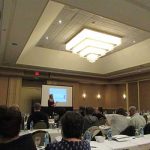 The date has now been announced: October 20th, 2018 from 8:30AM-4PM
The date has now been announced: October 20th, 2018 from 8:30AM-4PM
The place has also been announced: Malcolm Forbes Auditorium
Morristown Medical Center
100 Madison Ave, Morristown, NJ 07960
Now, all we need is to hear from you about what you think would be the best topics to present that day for an audience that is made up of patients, loved ones, nurses, and mental health professionals. Are there any issues you are interested in hearing more about, any burning questions about PNES?
To get you started, I am listing last year’s presentation topics:
Introduction to Psychogenic non-epileptic Seizures (PNES) –Lorna Myers, Ph.D.
How are psychogenic seizures diagnosed- Christos Lambrakis, M.D.
Treatments for PNES: evidence-based and new frontiers–Lorna Myers, Ph.D
The neuropsychology of PNES-Robert Trobliger, Ph.D.
PNES advocates speak: Eric L. Nelson and Millie Nelson and Brittney Marie Guertin
Maintaining your quality of life while living with PNES-Marcela Bonafina, Ph.D.
Caring for the Caretaker and local available resources-Ruifan Zeng, Ph.D.
We might repeat a couple because this is useful for newcomers who haven’t attended previous conferences but we want to add new topics. So, please help. Type in any ideas you may have and we will seriously consider them.
By the way, registration will open soon. As soon as that happens, I will announce it. Also, we are seeing about getting educational credits for psychologists and about perhaps having the event filmed so it can go online.


Veteran Affairs and PNES / PTSD for one.
I’ll keep going through my resources and get back with you.
1. Best ways to find treatment or a doctor that will understand how to treat your symptoms.
2. Maybe why most doctors don’t believe symptoms of patients or how to address a doctor or nurse that says a patient is faking their symptoms.
How to deal with PNES in a school setting. Resources for schools. Education for schools.
Yes, please! Resources for schools & also for the parents of children with PNES!
Great suggestion!
Research medicinal cannabis affects on combined diagnosis of PNES and mental health conditions.
Communication: (just brainstorming topics here)
-explaining to boss what accommodations you need
-handling communication in an interview. What do you disclose?
-safety needs, especially if your needs change
-communication with your main caregiver..anger, frustrations build. How can both parties handle this?
-dating
Ways to educate those closest to you.
How about turning it around and having a topic on PNES mimmics? For examaple, I was told by two neurologists and a psychiatrist – in a very non-compassionate way – that I had PNES and needed to be hospitalized as a psychiatric inpatient. When I went for a second opinion, the neurologist didn’t even look at more than 11 hours of recording before “confirming” PNES. I went through eight months of extremely distressing “PNES” episodes, four neurologists (none of whom would discuss specifics about my tests with me), 12 weeks of PNES-based counseling, and having to justify a third opinion to my insurance company.
I have hyperekplexia, or excessive startle response. This was determined through a combination of EEG, EMg, and video monitoring, all of which could have been done by/at any of the previous testing centers. With the proper dose of clonazepam, my episodes disappeared.
Except that I still occasionally smell smoke, and also have occasional aphasic episodes, neither of which occurred while I was being monitored. We’re working under the assumption that, based on scientific literature, I am having true simple partial seizurss (olfactory), but we’re still not sure about the aphasic episodes (which may be TIAs… another mimic of PNES if frequent and repeated.)
Please consider this as an important topic.
read my article in International Journal of Epilepsy, efirst. published 8-14-18. A Proposed Etiology of Psychogenic Nonepileptic Seizures. You are right. PNES diagnosis is wrong.
I hope to attend! I live in Texas but my family is in CT so I will try to find a way to commute. I would like to hear more about physiological non-epileptic seizures. I had them due to a medication adverse reaction and I haven’t found much information on them. None of my doctors considered that cause as a possibility and my neuropsychologist had never heard of them.
Lorna Myers, thanks so much for the post.Really thank you! Great.
PNES and PTSD and those with onset on vocal tics.
Treatment!
Although I won’t be able to attend. I would like to hear considerations or thoughts of having a specialized in patient facility for those who can or have the ability to seek a form of treatment that could help train a person into thinking and feeling ways to help cope and minimize their PNES.
Also having different methods of therapies that may be helpful.